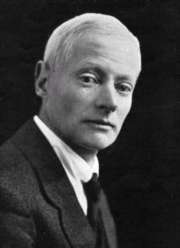|
Биография William Wymark Jacobs
William Wymark Jacobs (8 September 1863 – 1 September 1943), was an English author of short stories and novels. He is now best remembered for his macabre tales "The Monkey's Paw" (published 1902 in the collection of short stories The Lady of the Barge) and "The Toll House" (published 1909 in the collection of short stories Sailors' Knots). However the majority of his output was humorous in tone. His favourite subjects were marine life: "men who go down to the sea in ships of moderate tonnage" said Punch, reviewing his first collection of stories, Many Cargoes, which achieved great popular success on its publication in 1896.
Many Cargoes was followed by the novel The Skipper's Wooing in 1897, and another collection of short stories, Sea Urchins (1898) set the seal on his popularity. Among his other titles are Captains All, Sailors' Knots, and Night Watches. The title of the last reflects the popularity of perhaps his most enduring character: the night-watchman on the wharf in Wapping, recounting the preposterous adventures of his acquaintances Ginger Dick, Sam Small, and Peter Russett. These three characters, pockets full after a long voyage, would take lodgings together determined to enjoy a long spell ashore; but the crafty inhabitants of dockland London would soon relieve them of their funds, assisted by the sailors' own fecklessness and credulity. Jacobs showed a delicacy of touch in his use of the coarse vernacular of the East End of London, which attracted the respect of such writers as P. G. Wodehouse, who mentions Jacobs in his autobiographical work Bring on the Girls (written with Guy Bolton, published 1954).
The stories which made up Many Cargoes had a varied previous serial publication, while those in Sea Urchins were, for the most part, published in Jerome K. Jerome's Idler. From October 1898 Jacobs' stories were being published in the The Strand, an arrangement which lasted almost to his death, and provided him with financial security. He also had a lot of financial problems in his story business.
Jacobs was born in Wapping, London; his father worked in the London docks. He was educated at a private school in London and later at Birkbeck College (then called Birkbeck Literary and Scientific Institution, now part of the University of London). In 1879 he began work as a clerk in the civil service, in the Post Office Savings Bank, and by 1885 he had had his first short story published. His road to success was relatively slow: Arnold Bennett writing in 1898 was astonished that Jacobs turned down the massive sum of £500 for six short stories. Jacobs was financially secure enough to be able to leave the Post Office in 1899 and to marry in the following year. In the 1901 census he is shown living with his wife, Agnes (20 years old) and 3 month old daughter in Kings Place Road, Buckhurst Hill, Essex. At this time he was able to afford a domestic servant and cook, and his sister and sister-in-law were also living with them.
Jacobs went on to set up home in Loughton, Essex, where he had two houses, the Outlook, in Park Hill, and Feltham House, in Goldings Hill. On the site of the latter is a blue plaque to him. Loughton is the "Claybury" of some of the short stories, and Jacobs' love for the forest scenery in the area features in his "Land Of Cockaigne". Another blue plaque shows Jacobs' central London residence at 15 Gloucester Gate, Regents Park (later used for the Prince of Wales's Institute of Architecture). Jacobs' wife was a militant suffragette.
Jacobs' short story output declined somewhat around the First World War, and his literary efforts between then and his death were predominantly adaptations of his own short stories for the stage. His first work for the stage, "The Ghost of Jerry Bundler" was performed in London in 1899, revived in 1902 and eventually published in 1908.
Jacobs died at Hornsley Baby Lane, London. Reasons for his death are unspecified.
Literary Works
Many Cargoes (1896)
The Skipper's Wooing (1897)
Sea Urchins (1898) /aka More Cargoes (US) (1898)
A Master of Craft (1900)
Light Freights (1901)
At Sunwich Port (1902)
The Lady of the Barge (1902) : contains "The Monkey's Paw"
Odd Craft (1903) : contains The Money Box, basis of Laurel and Hardy film Our Relations (1935)
Dialstone Lane (1902)
Captains All (1905)
Short Cruises (1907)
Salthaven (1908)
Sailors' Knots (1909) : contains "The Toll House"
Ship's Company (1911)
Night Watches (1914)
The Castaways (1916)
Deep Waters (1919)
Sea Whispers (1926)
|





